Filter by
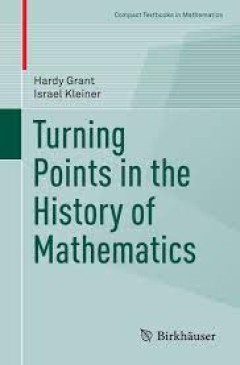
Turning Points in the History of Mathematics
This book explores some of the major turning points in the history of mathematics, ranging from ancient Greece to the present, demonstrating the drama that has often been a part of its evolution. Studying these breakthroughs, transitions, and revolutions, their stumbling-blocks and their triumphs, can help illuminate the importance of the history of mathematics for its teaching, learning, and …
- Edition
- -
- ISBN/ISSN
- 978-1-4939-3264-1
- Collation
- -
- Series Title
- -
- Call Number
- -
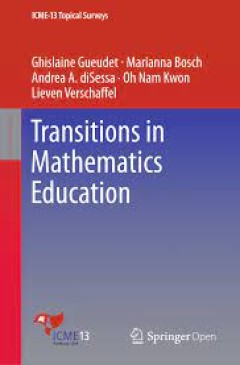
Transitions in Mathematics Education
This book examines the kinds of transitions that have been studied in mathematics education research. It defines transition as a process of change, and describes learning in an educational context as a transition process. The book focuses on research in the area of mathematics education, and starts out with a literature review, describing the epistemological, cognitive, institutional and socioc…
- Edition
- -
- ISBN/ISSN
- 978-3-319-31622-2
- Collation
- -
- Series Title
- -
- Call Number
- -
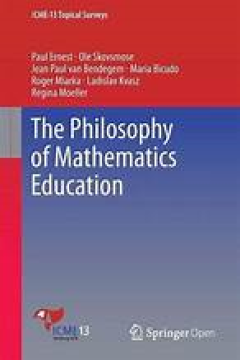
The Philosophy of Mathematics Education
This survey provides a brief and selective overview of research in the philosophy of mathematics education. It asks what makes up the philosophy of mathematics education, what it means, what questions it asks and answers, and what is its overall importance and use? It provides overviews of critical mathematics education, and the most relevant modern movements in the philosophy of mathematics. …
- Edition
- -
- ISBN/ISSN
- 978-3-319-40569-8
- Collation
- VII, 26
- Series Title
- ICME-13 Topical Surveys
- Call Number
- -

Cases of Mathematics Professional Development in East Asian Countries Using …
This book shows how video technology can be used to inform teachers’ personal practice, and provides new data and real-world case studies not covered by any previous book on the subject. Initial chapters explore how practicing teachers can view their own recorded lessons and take steps to improve their methods, while subsequent chapters examine how pre-service and in-service teachers can use…
- Edition
- -
- ISBN/ISSN
- 978-981-287-405-4
- Collation
- -
- Series Title
- -
- Call Number
- 510.07
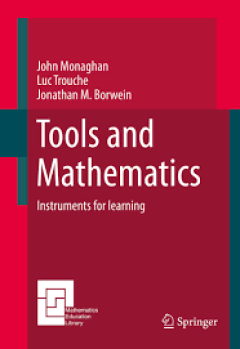
Tools and Mathematics
This book is an exploration of tools and mathematics and issues in mathematics education related to tool use. The book has five parts. The first part reflects on doing a mathematical task with different tools, followed by a mathematician's account of tool use in his work. The second considers prehistory and history: tools in the development from ape to human; tools and mathematics in the ancien…
- Edition
- -
- ISBN/ISSN
- 978-3-319-02396-0
- Collation
- -
- Series Title
- -
- Call Number
- -

Thomas Jefferson and his Decimals 1775–1810: Neglected Years in the History…
This well-illustrated book, by two established historians of school mathematics, documents Thomas Jefferson’s quest, after 1775, to introduce a form of decimal currency to the fledgling United States of America. The book describes a remarkable study showing how the United States’ decision to adopt a fully decimalized, carefully conceived national currency ultimately had a profound effect on…
- Edition
- -
- ISBN/ISSN
- 978-3-319-02505-6
- Collation
- -
- Series Title
- -
- Call Number
- -

Theories in and of Mathematics Education Theory Strands in German Speaking C…
This survey provides an overview of German meta-discourse on theories and mathematics education as a scientific discipline, from the 1970s to the 1990s. Two theory strands are offered: a semiotic view related to Peirce and Wittgenstein (presented by Willibald Dörfler), and the theory of learning activity by Joachim Lompscher (presented by Regina Bruder and Oliver Schmitt). By networking the tw…
- Edition
- -
- ISBN/ISSN
- 978-3-319-42589-4
- Collation
- -
- Series Title
- -
- Call Number
- -

The Troika of Adult Learners, Lifelong Learning, and Mathematics Learning fr…
This book presents a synopsis of six emerging themes in adult mathematics/numeracy and a critical discussion of recent developments in terms of policies, provisions, and the emerging challenges, paradoxes and tensions. It also offers an extensive review of the literature adult mathematics education. Why do adults want to learn mathematics? Did they enjoy mathematics at school so much that they …
- Edition
- -
- ISBN/ISSN
- 978-3-319-32808-9
- Collation
- -
- Series Title
- -
- Call Number
- -

The Teaching and Learning of Statistics International Perspectives
This book presents the breadth and diversity of empirical and practical work done on statistics education around the world. A wide range of methods are used to respond to the research questions that form it's base. Case studies of single students or teachers aimed at understanding reasoning processes, large-scale experimental studies attempting to generalize trends in the teaching and learning …
- Edition
- -
- ISBN/ISSN
- 978-3-319-23470-0
- Collation
- -
- Series Title
- -
- Call Number
- -
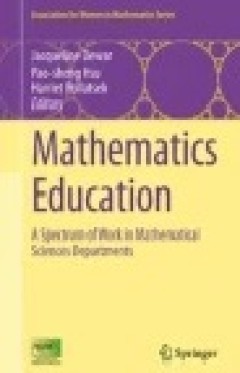
Mathematics Education: A Spectrum of Work in Mathematical Sciences Departments
Many in the mathematics community in the U.S. are involved in mathematics education in various capacities. This book highlights the breadth of the work in K-16 mathematics education done by members of US departments of mathematical sciences. It contains contributions by mathematicians and mathematics educators who do work in areas such as teacher education, quantitative literacy, informal educ…
- Edition
- -
- ISBN/ISSN
- 978-3-319-44950-0
- Collation
- -
- Series Title
- -
- Call Number
- -
 Computer Science, Information & General Works
Computer Science, Information & General Works  Philosophy & Psychology
Philosophy & Psychology  Religion
Religion  Social Sciences
Social Sciences  Language
Language  Pure Science
Pure Science  Applied Sciences
Applied Sciences  Art & Recreation
Art & Recreation  Literature
Literature  History & Geography
History & Geography